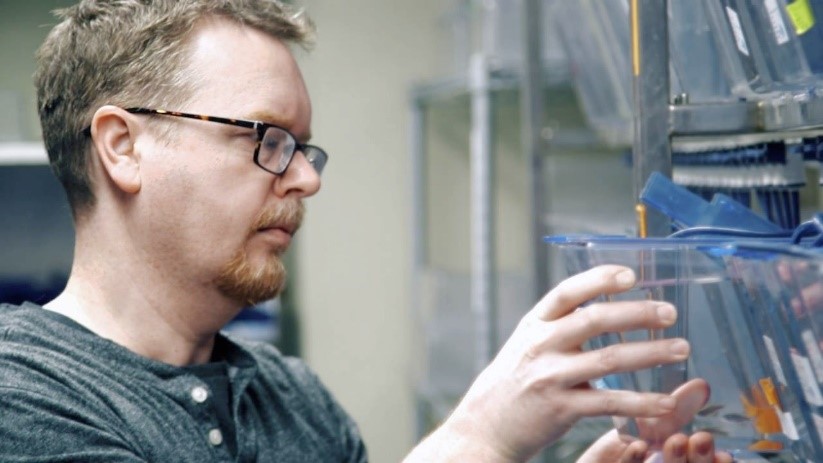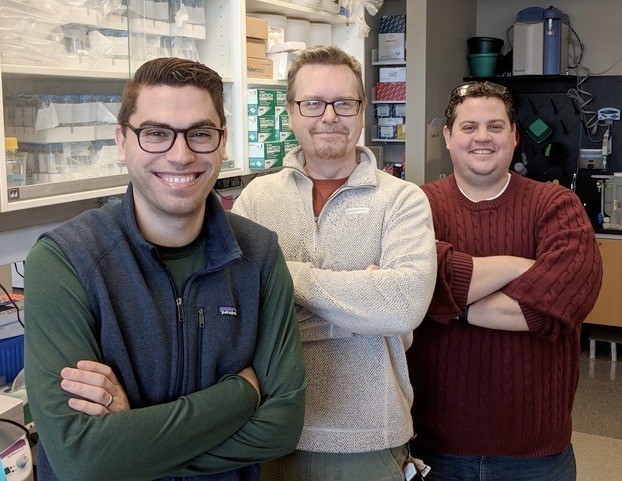The universal language of science: An interview with an Edinburgh scientist

Making the decision to apply for and accept the offer to do my PhD in Edinburgh was a big decision for me. You might think the mere 30 minute flight to Edinburgh from my home in Belfast, Northern Ireland is no distance at all. But for me, a self-professed home bird, it’s a big jump (not to mention the fact the move happens to coincide with a global pandemic). My uncle, Andrew McCallion, a geneticist currently working in Johns Hopkins, USA was influential in my decision making process, encouraging me to take the leap and choose the PhD in a field I had always hoped to work in rather than taking the safe option at home. So when we were encouraged to write a blog, with a topic of our choice, interviewing an Edinburgh scientist, I thought Andrew would be the perfect candidate, being a visiting professor and faculty member at the IGMM in Edinburgh (okay so I bent the rules a little…).
Considering his career path which has involved moving from Northern Ireland, to Scotland, to Paris and to various parts of the US I thought I would pick his brain about the importance of pursuing collegial relationships across different countries and institutions to propel your career in science.
Andrew, as I mentioned previously, is currently based in Johns Hopkins in the McKusick Nathans Department of Genetic Medicine. He runs a research lab with an emphasis on the role that non-coding regulatory variation plays in common disease as well as dissecting the molecular and genetic mechanisms of common complex diseases, primarily of the central nervous system.
Having completed his undergraduate degree at Queen’s University Belfast in Northern Ireland, I wondered why he made the decision to do his PhD in Glasgow. ‘Money!’ he initially exclaimed jokingly, explaining that his position in Glasgow had meant he had a human genome project scholarship, providing him with a little more financial stability. However more importantly he went on to explain that the then chair at Queens had given him the same advice he years later gave to me – that it’s important to get the experience of other institutions as there is a risk of becoming, in his terms ‘parochial’ in your outlook if you stayed only in the place where you had grown up and completed your undergraduate study. He commented that this was largely the advice he followed during his entire training and career.
When discussing his time at graduate school, Andrew emphasised the value of developing relationships with colleagues in different parts of the world and the benefit this can have to your work. He recalled how he had approached his supervisor explaining the current technology available in Glasgow wasn’t going to allow him to complete the work in the time he had. His supervisor then promptly shipped him off to Paris, giving him the opportunity to work under his colleague there (however failing to mention this colleague happened to be the director of the Pasteur Institute at the time!).
At the end of his thesis work, which was primarily focused on the functional genetics study of Parkinson’s disease, Andrew, now an aspiring neuroscientist, took a job in a small biotech start-up company in Glasgow, focusing on drug development for neurological disease. His time there provided clarity on his next career move, now realising his interests lay more in understanding the mechanistic nature of common complex disease. So by the time he was applying for postdoctoral positions, he no longer wanted to be a strict molecular neuroscientist. Andrew notes the importance of actively pursuing research opportunities irrespective of the distance from home. Having approached his soon to be postdoctoral mentor, a population geneticist working on Hirschsprung disease in Cleveland, USA, he advocated his experience in functional genetics in the context of disease as a mechanism of taking the work there to the next level of understanding. His work there and in Johns Hopkins, Baltimore, USA where he currently resides, led to the identification of a non-coding intronic enhancer mutation of a proto-oncogene, forming the foundation of his career now in studying the role of non-coding mutations in complex neurological disease.
When asked about the advantages of building relationships and links with other institutions and researchers in different countries, Andrew noted that the nature of science is that it is much better performed in relationships. He explained that an advantage of science is that it is inherently an open social collegial world. The opportunity to travel and interact with people from other institutions is a real bonus and an opportunity to hear and experience other ways of thinking about science and connect new people that ideally you can not only form a collegial relationship with but also a friendship that lasts your entire career.
Andrew’s link with Edinburgh dates back to his graduate school days, wherein he was able to develop collegial relationships with multiple faculty members in Edinburgh at the time through his mentor in Paris. In later times, having enjoyed speaking at Edinburgh and his interactions with staff and students there he sought to establish a more consistent connection. Now a visiting faculty member at the IGMM, Andrew works closely with colleagues here to develop workshops for the graduate programme, allowing him to follow the work of many Edinburgh based students he has interacted with over the years – an aspect of inter-institutional relationships he notes that he particularly enjoys.

L-R, Paul Hook, Andrew McCallion and Loyal Goff after publication of single-cell study on Parkinson’s disease. Johns Hopkins, USA, 2018. Picture provided by Andrew McCallion.
I finished our interview by asking a final question: what would his advice be to young researchers thinking of undertaking a PhD or postdoctoral position in another country? His initial response fairly simple – if you have the opportunity, take it! He noted that coming from a small country wherein the number of academic institutions is more limited, he found the opportunity to live in different parts of the world and experience how scientific study is done in other cultures invaluable. Not dismissive of the challenges working away from home can bring he emphasised the importance of immersing yourself in the culture and endeavouring to not live your training period in constant eagerness to return home.
His last piece of advice, more broadly applicable to PhD studies, was to recognise that your training is only for a finite period of time. ‘Invest in your work, you have a short time as PhD student to acquire the knowledge and training that will be the foundation for the rest of your career. You never want to walk away from your PhD thinking I could have done more, I could have worked harder. Whether you stay at home or go abroad, invest in the pursuit of your own success.’



